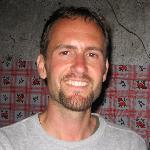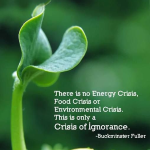 Morgan Ruelle Jan 16, 2015 08:44 |
Hi staplets,
Thanks for starting this exciting proposal! I think it is a great idea to link the revitalization of the calendars to extension programs as well as the national meteorological agency. I strongly agree that both the meteorological agency and villagers would benefit from information exchange. As you expand this proposal, I think it would be helpful to add specifics regarding their communication, including the kinds of information they might be sharing and their means of exchange (by SMS, cell phone calls, radio, community meetings, etc). Do you think that there are key instruments (e.g. rain gauges, thermometers) that could be distributed to enhance data collection and the ability of individual farmers to observe/respond to change? I also appreciate the question you raise about gender roles and 'keepers' of the calendar, particularly with regard to emigration.
I look forward to seeing how this proposal develops. Safe travels and hope to see more soon!
Morgan
|
 Subhashree Mishra Jan 22, 2015 12:38 |
Hello Staplets,
I very much agree with Morgan on this being an exciting proposal! I really like the way you plan to build collaborations to address the issues through multiple partnerships.You seem to have extensive experience working on climate issues in developing countries. I am really looking forward to see how your proposal develops. It is a very comprehensive and well thought of proposal.
|
 Simon Riley Feb 20, 2015 06:22 |
Hi Staplets!
Firstly, let me say how much I like your proposal! You bring up a variety of important themes, while still keeping the whole proposal clear and complete - its impressive.
There is one area, however, where I was hoping you might share your thoughts - probably it is something you've given a lot of consideration to already but just lacked the space to express it (I know our team has struggled with this a lot). It relates to the use of altitude transects:
Clearly, altitude gradient is going to be a very important factor in analyzing climate-change induced shifts to ecosystem structure/function, agricultural phenology, and so on. But what about other geographic factors, such as direction of exposure, degree of slope, soil moisture regime, and soil type, etc? Is there a risk of missing important (non-linear?) patterns if the observation of ecosystem changes is made only through the lens of an altitude transect?
Really looking forward to hearing your thoughts on the subject!
Best Wishes,
Simon
|
 Sarah Opitz-stapleton Feb 24, 2015 07:21 | Proposal contributor
Hi Simon (and team)!
It is challenging coming up with a mini-proposal with such limited space - there are just too many factors and considerations that can't be expressed.
There are many factors - such as those that you mentioned above, or others such as extreme differences in precipitation amounts and type over short horizontal distances due to orography (see Lang and Barros 2002 for example) - that will influence climate-change induced shifts. Local land use change - shifting crop types and patterns, different livestock initiatives, any micro-hydro projects, irrigation practices, etc. - will also influence local climate shifts in ways that station-based observations (or lack there of) will not necessarily capture.
There are a couple of thoughts I pose back:
If the main focus of the project is to help communities improve their resilience - not just to climate variability and change - by helping them to restore and adapt traditional ways of knowing - perhaps taking an overly biology/ecosystem centric approach to selecting the communities is not as useful? Let me explain.
The ultimate goal is to help agropastoralist communities throughout the Pamir's with resilience. The ecological context of each community is highly localized AND shifting. All of the communities are facing this challenge, in addition to gender-cultural, economic migration, conflict (some), differentiated access to services, uncertain governance and other challenges. Short of picking up and relocating (happening both voluntarily and involuntarily in some locations like in China) the entire community, the community is 'stuck' with its unique set of shifting opportunities and constraints. There are no ideal criteria for selecting which communities with which to begin working.
Based on my experience in working with communities and donors on climate adaptation, development and DRR programs - you will have a hard time convincing many types of donors to fund a project using strictly ecologically-based criteria for community selection when the project goal is community-based adaptation. For a pilot project in which you will be testing and exploring with the community(ies), types of relevant bio-indicators and weaving these into new modes of knowledge sharing - it is better to chose communities close together and that have regular communication with each other. Doing so can help the communities maintain knowledge networks long after the project has ended. Furthermore, ADB with the PPCR is proposing a project in which communities pay for climate information (seasonal forecasts, early warning, etc.) delivered via SMS. I have reservations about such a system, among them being that such systems can sometimes agropastorialists as passive recipients in 'need' of information and not as valid knowledge generators and possessors of their own right and ability to pay. I digress here. The PPCR is also doing climate resilience work in 5 pilot districts; you will have better project buy-in at different institutional levels if it can be synched with existing efforts.
This could be done by: 1) selecting communities along an elevation transect, and capture certain types of shifts; or, 2) choose communities all at a similar elevation within a close horizontal proximity and capture other types of shifts. As there are many shifts underway, and some most certainly are/will be non-linear given overall, massive land use change, air pollution and the Asian Monsoon System changes underway over Asia that in turn impact Central Asia's climate, it is more important to provide tools for documenting and responding to the shifts. It is not possible a priori to project/predict all potential types of relevant change (relevant to whom? at what time scales? why relevant?) and use this as the basis for community selection. Far more important is to assist the communities to formally document whatever types of shifts they are experiencing, the benefits and negativities associated with each, establish a monitoring system, and help them feed this knowledge into the formal scientific and development initiatives underway in Tajikistan (I am less familiar with efforts in Afghanistan).
Some musings...
Warm Regards,
Sarah
|
 Sarah Opitz-stapleton Feb 24, 2015 07:24 | Proposal contributor
should say "treat agropastorialists as passive recipients"
|
 Morgan Ruelle Mar 4, 2015 05:09 |
Hi Staplets,
I wanted to let you know that we have expanded the 'Summary' field to 4000 characters so that you can incorporate some of the great ideas that are coming up in your discussion with Simon et al. I hope that helps!
Best,
Morgan
|
 Michael Hayes Mar 10, 2015 09:16 |
Hello Sarah,
Like everyone else, I'm impressed with your work on this effort. I'm far more of a technologist than a scientist and I appreciate your detailed insight into this challenge. The technology suite being proposed in my proposal may be weaved into the management regimen you are proposing.
Please let me know if I can clarify the technology and or how the different technologies can be used in synergistic ways. I never know just how deep people wish to go into the technology and thus tend to keep things at the topical levels.
Best wishes,
Michael
|
 Natasha Udu-gama Apr 17, 2015 09:58 |
Hi Sarah,
29 days until this contest ends! At this point, I would encourage you to start fine-tuning your proposal. We now have an amazing set of judges from the National Consortium for Atmospheric Research (Dr. Greg Holland), The University of Maryland (Dr. Surya Sharma), College of the Atlantic (Dr. Doreen Stabinsky) and The Lowlander Center (Dr. Kristina Peterson) not to mention, our two esteemed advisors. Please see: https://www.climatecolab.org/web/guest/plans/-/plans/contestId/1301102.
I hope your proposal will wow them!
Best of luck!
Natasha
|
